10 Benefits of Enterprise Data Warehouse (EDW) for Analysts

10 Benefits of Enterprise Data Warehouse (EDW) for Analysts
Overview
The article titled "10 Benefits of Enterprise Data Warehouse (EDW) for Analysts" explores the various advantages that an EDW offers to analysts within organizations. It emphasizes that EDWs enhance decision-making processes by consolidating data from diverse sources, improving data quality, and ensuring scalability. Collectively, these features empower analysts to derive actionable insights and drive strategic growth.
This conclusion is substantiated by the article's thorough examination of how centralized data management streamlines information retrieval. Enhanced data quality and integration capabilities contribute to more accurate analyses and informed decisions. Furthermore, the focus on compliance, cost efficiency, and improved customer insights illustrates the comprehensive benefits of utilizing an EDW in today's data-driven environment.
Introduction
The rise of data-driven decision-making has fundamentally transformed the landscape of business analytics, making access to high-quality information more crucial than ever. Analysts are now empowered by enterprise data warehouses (EDWs), which streamline data management and enhance the quality and accessibility of insights. As organizations strive to leverage these powerful tools, a pressing question arises: how can analysts fully harness the capabilities of EDWs to drive strategic growth and improve decision-making? This article delves into the myriad benefits of EDWs, illustrating how they can be pivotal in shaping successful, informed business strategies.
Initial Data Offering: Access to High-Quality Datasets for Informed Decision-Making
The Initial Data Offering (IDO) platform provides analysts with access to a diverse array of high-quality datasets, a feature that is crucial for informed decision-making. By subscribing to IDO, analysts can discover new datasets daily, which ensures they remain updated with the latest trends across various fields. This continuous influx of unique datasets not only enhances their analytical capabilities but also empowers them to extract actionable insights that drive better business outcomes.
Given that 91% of companies recognize the importance of information-driven decision-making, platforms like IDO play a pivotal role in bridging the gap between information availability and effective analysis. With premium access, analysts can leverage these high-quality collections to make strategic decisions based on comprehensive and reliable information, ultimately fostering a culture driven by insights within organizations.
How might these datasets transform your decision-making processes? Consider the potential impact of having such resources at your fingertips.
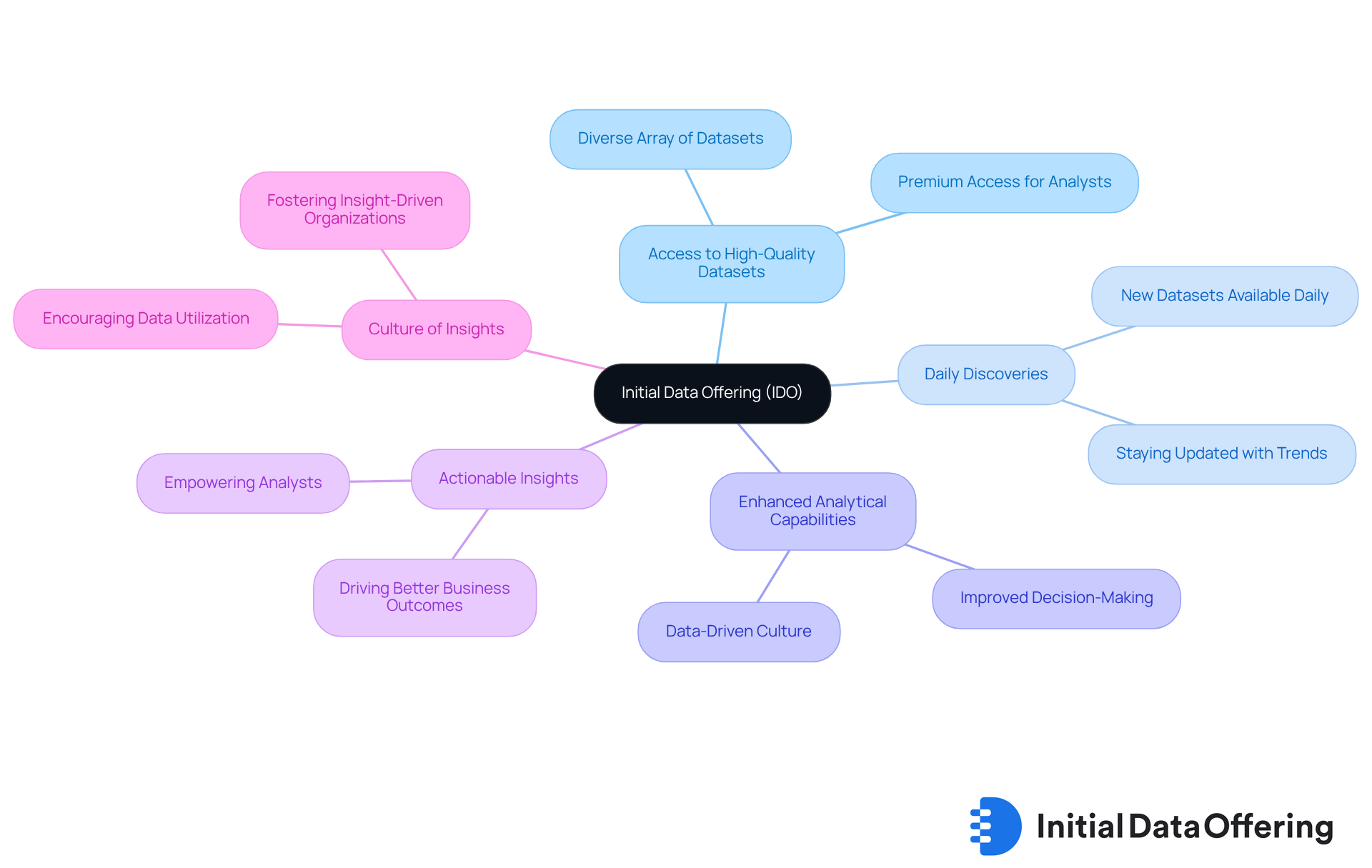
Centralized Data Management: Streamline Data Collection and Analysis
Centralized information management within an enterprise data warehouse (EDW) significantly enhances the efficiency of collection and analysis by consolidating details into a single repository. This method reduces the complexity linked to managing various information sources, enabling analysts to retrieve essential details quickly. By dismantling information silos, organizations can effortlessly combine and examine information, which speeds up the creation of insights and facilitates informed decision-making.
According to recent findings, 57% of enterprises have embraced a coordinated information strategy, highlighting the increasing acknowledgment of the significance of centralized information management. Moreover, information management experts emphasize that streamlined information collection not only boosts operational efficiency but also enhances quality, ultimately resulting in improved analytical outcomes.
For example, organizations utilizing an enterprise data warehouse (EDW) solution report a significant decrease in the time spent searching for information. Some professionals observe that individuals can squander up to 80% of their time on information retrieval. This shift towards centralized information management is not merely a trend; it is a strategic necessity for organizations aiming to thrive in an information-driven landscape.
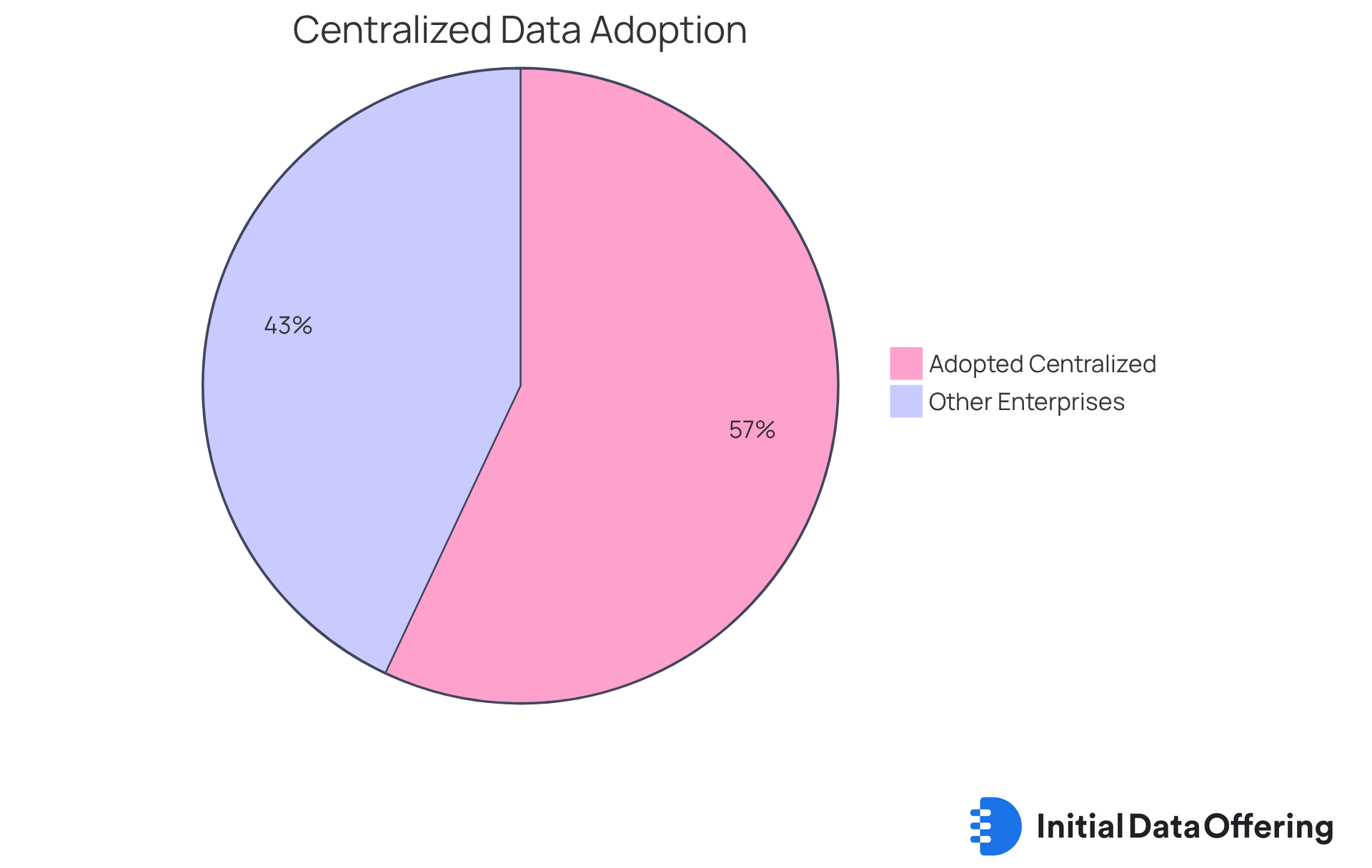
Enhanced Data Quality: Ensure Accuracy in Market Insights
An enterprise data warehouse (EDW) enhances quality through stringent governance and validation processes. These features ensure that the information utilized for analysis is not only accurate but also consistent and up to date. Notably, 92% of entities are evaluating or investing in platforms that automate lead information governance. This transition towards an enterprise data warehouse (EDW) is essential, as it enables automation that directly contributes to generating reliable market insights, which are vital for informed business decisions and identifying growth opportunities.
Research indicates that 30% of marketing professionals prioritize quality enhancements over other elements, such as workflow automation, to improve performance. Additionally, entities that effectively establish governance frameworks often report improved precision in their analyses, leading to superior strategic outcomes. For instance, firms adopting comprehensive information governance practices have seen significant improvements in market insights, demonstrating the tangible benefits of prioritizing information quality.
Moreover, 43% of Chief Marketing Officers (CMOs) believe that less than half of their marketing information is trustworthy. This statistic underscores the critical need for companies to regularly assess their information governance frameworks. Addressing issues such as information completeness and consistency is crucial, as these factors affect 31% and 26% of respondents, respectively.
How can your organization enhance its information governance to ensure high-quality data for decision-making?
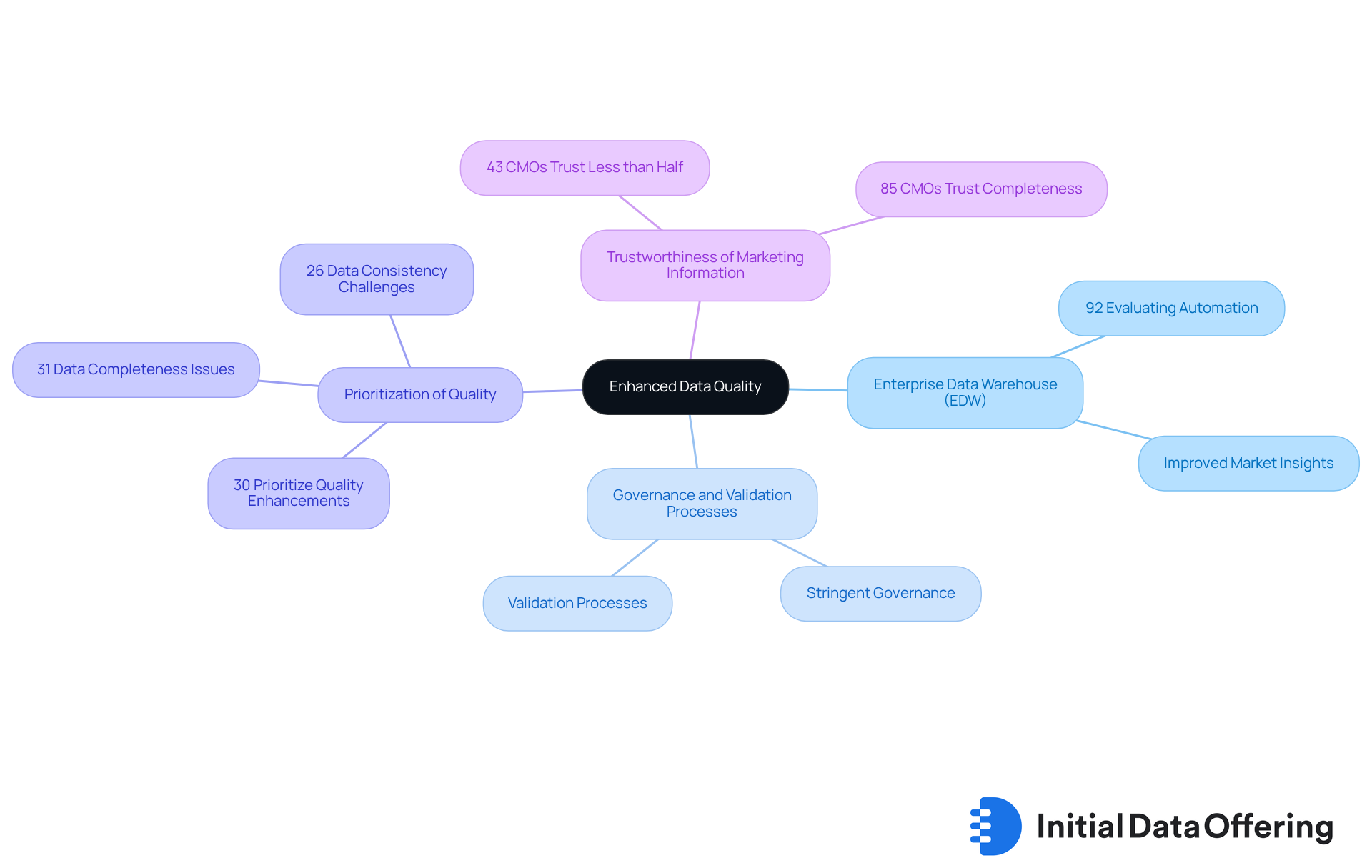
Scalability: Adapt to Growing Data Needs Efficiently
A significant feature of an enterprise data warehouse (EDW) is its scalability. As organizations grow, their information needs evolve. An enterprise data warehouse (EDW) effectively scales to accommodate the increasing volumes and complexity of data. This ensures that analysts have the necessary resources to conduct evaluations without interruptions. Such adaptability is essential for sustaining operational efficiency and bolstering strategic initiatives.
How might your organization benefit from the scalability of an enterprise data warehouse (EDW)? Consider the implications of having a system that grows alongside your data requirements.
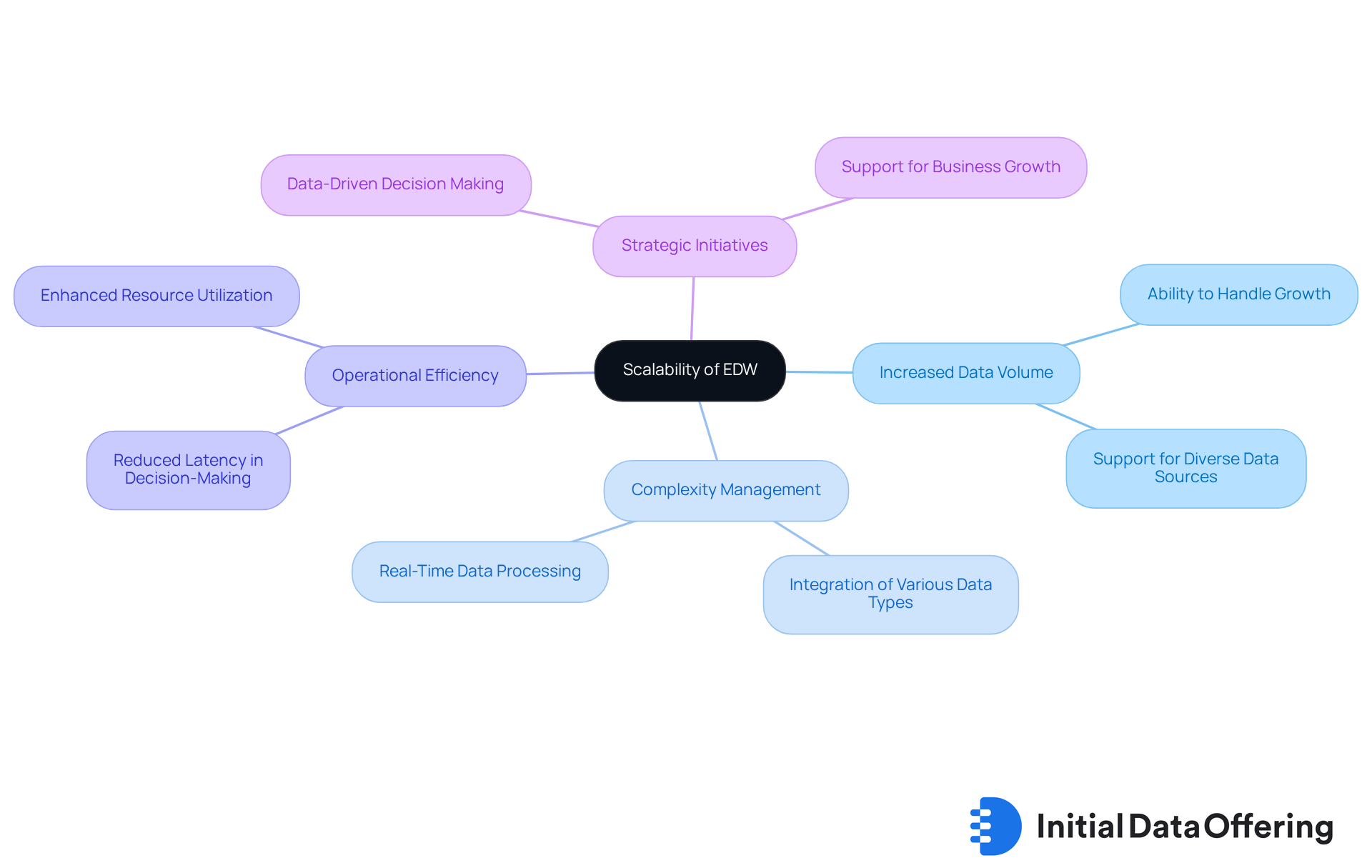
Historical Analysis: Identify Trends and Make Predictions
An enterprise data warehouse (EDW) serves as a crucial repository for extensive volumes of historical information, meticulously organized to facilitate thorough analysis. This wealth of information allows analysts to discern trends over time, which is vital for making informed predictions about future market behaviors. For example, companies can scrutinize previous sales data to anticipate demand fluctuations. This proactive approach enables them to adjust inventory and marketing strategies effectively. Such predictive capabilities are not merely advantageous; they are essential for businesses striving to maintain a competitive edge and swiftly adapt to evolving market conditions.
By leveraging advanced analytics techniques, including machine learning algorithms, analysts can uncover patterns that inform strategic decisions. This ultimately drives better outcomes and enhances operational efficiency. However, it is crucial to acknowledge the challenges associated with historical information, such as potential biases and inaccuracies that can skew predictions. To effectively harness historical information for trend identification, analysts should ensure data quality and consider integrating multiple sources into the enterprise data warehouse (EDW). This comprehensive view can significantly improve the reliability of insights drawn from the data.
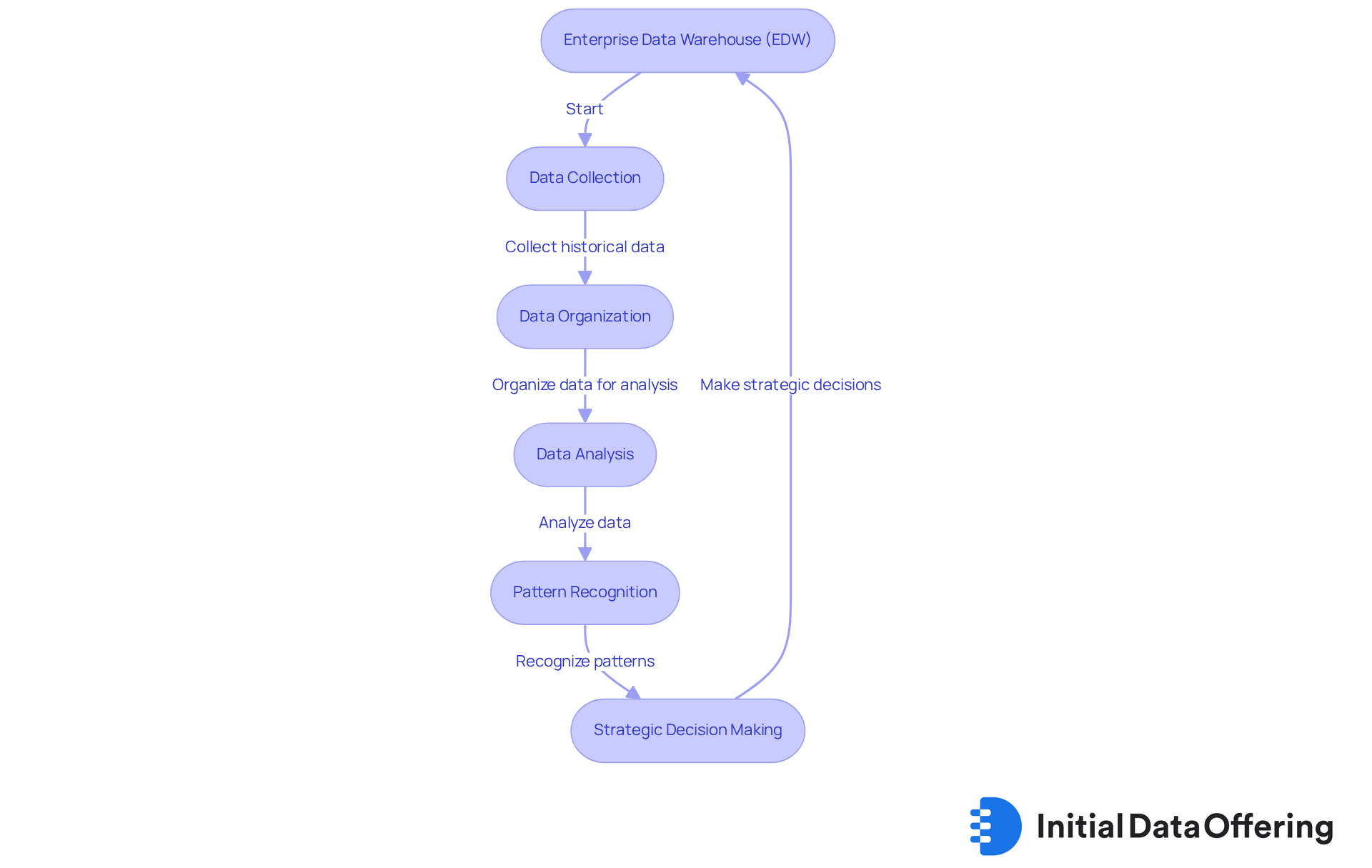
Compliance and Security: Safeguard Sensitive Data
Enterprise data warehouse (EDW) systems serve as a vital component in the security and compliance of sensitive information. By implementing strict access measures and robust encryption methods, organizations can effectively protect their data from unauthorized access and potential breaches. This proactive approach not only mitigates risks associated with data exposure but also cultivates trust among stakeholders, which is crucial for sustaining a positive market reputation.
Organizations that have adopted an enterprise data warehouse (EDW) frequently report significant improvements in their governance practices, which leads to enhanced compliance with industry regulations.
How can your organization benefit from such practices? Expert insights reveal that those prioritizing information protection not only safeguard their assets but also bolster their credibility in the marketplace, ultimately fostering customer loyalty and gaining a competitive edge.
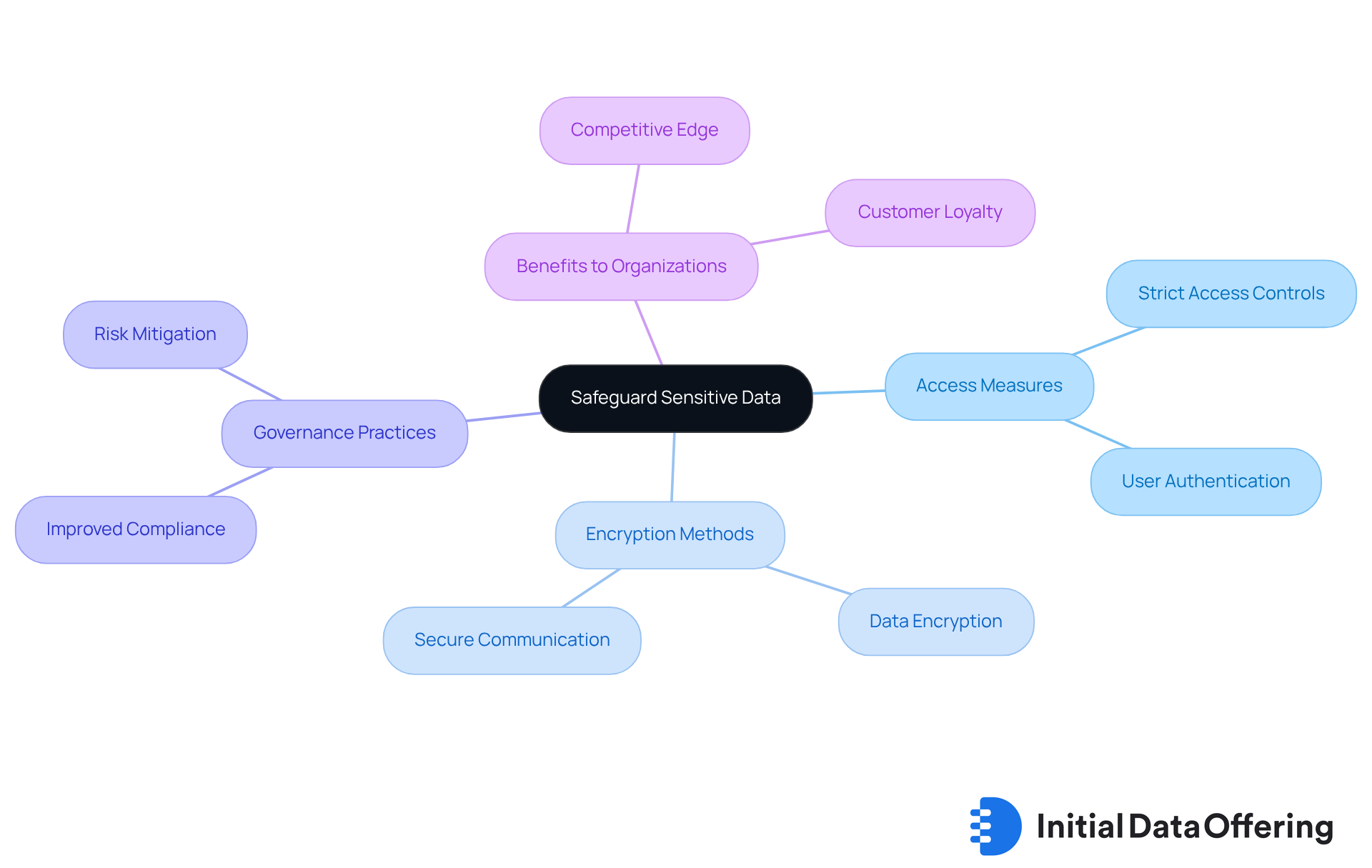
Improved Decision-Making: Leverage Data for Strategic Insights
Organizations leveraging enterprise data warehouse (EDW) can harness the power of information to derive strategic insights that significantly enhance decision-making processes. The ability to meticulously analyze comprehensive datasets allows analysts to identify patterns and correlations that might otherwise remain hidden. This data-driven methodology not only facilitates informed decisions aligned with organizational goals but also propels growth and boosts operational efficiency. For instance, firms that embrace information-driven strategies are 23 times more likely to attract new clients and 19 times more likely to attain profitability, thanks to the enhanced information access and analysis capabilities provided by the enterprise data warehouse (EDW).
Moreover, while 91% of companies acknowledge the essential role of information-driven decision-making in their success, only 57% effectively apply it. This disparity emphasizes the need for firms to prioritize strong information integration and analytics capabilities. Recent case studies demonstrate that companies utilizing advanced analytics report an average revenue growth of 15%, highlighting the tangible advantages of a robust information strategy. Furthermore, it is significant that merely 50% of the accessible information in firms is employed for decision-making, underscoring the necessity of optimizing information usage within an enterprise data warehouse (EDW).
As the landscape evolves, embracing comprehensive datasets within an enterprise data warehouse (EDW) becomes essential for entities aiming to thrive in a competitive environment. How can your organization better utilize its data to drive growth? By focusing on the integration of advanced analytics, companies can unlock the full potential of their information resources.
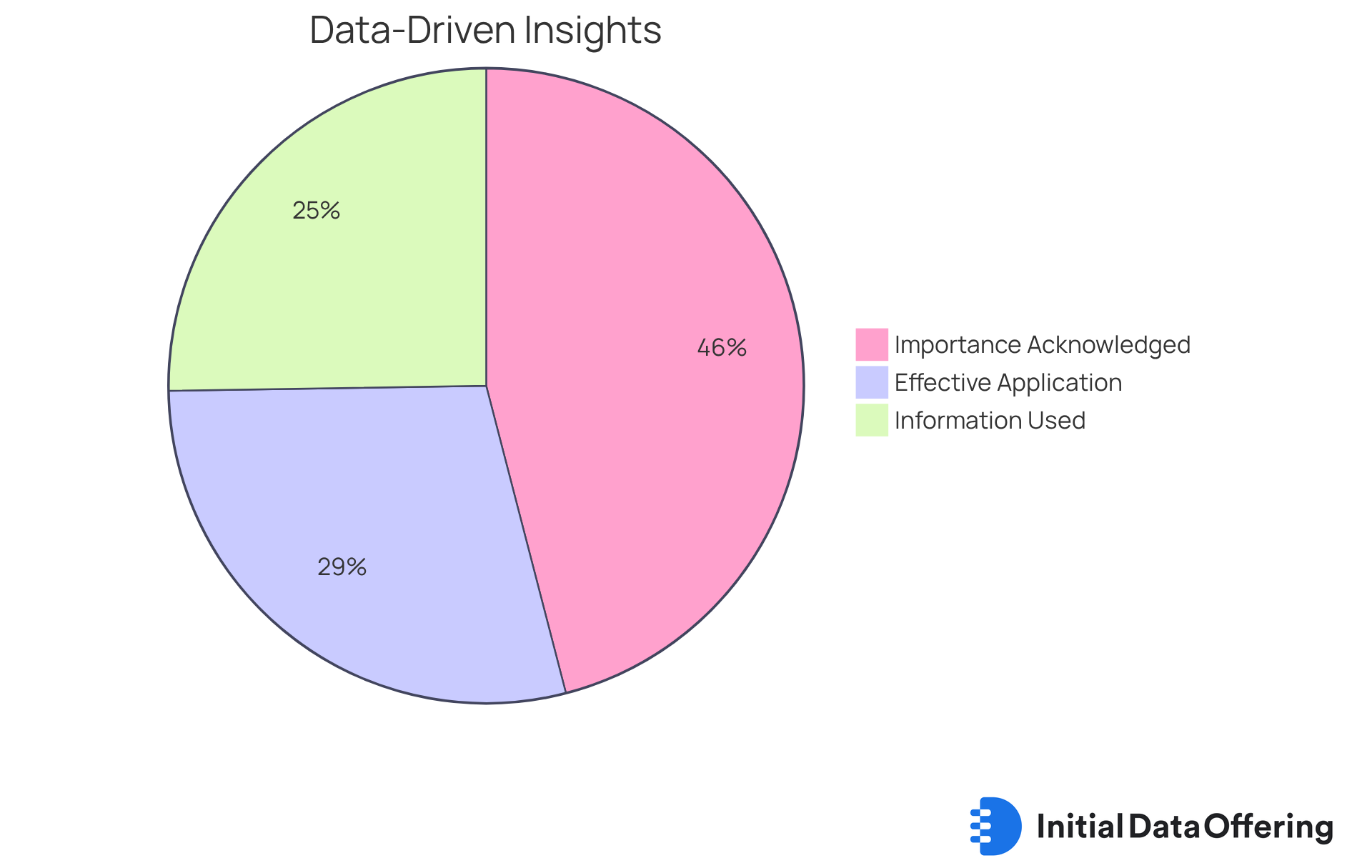
Enhanced Customer Insights: Understand Consumer Behavior
An enterprise data warehouse (EDW) serves as a powerful tool for analysts, enabling them to gain deeper customer insights by consolidating information from diverse sources, including sales, marketing, and customer feedback. This comprehensive viewpoint on consumer behavior allows businesses to customize their offerings more effectively, ultimately satisfying customer needs. By analyzing the factors that influence customer decisions, businesses can significantly enhance satisfaction and loyalty—both of which are crucial for driving revenue growth. In fact, companies that excel in customer experience see their revenue grow 80% faster than their competitors, according to McKinsey.
Moreover, 90% of Customer Data Platform (CDP) users report enhanced customer loyalty through hyper-personalized experiences, while 88% observe improvements in cross-sell and up-sell efforts. These statistics underscore the importance of integrated information in fostering meaningful customer relationships. As organizations increasingly embrace data-driven strategies, leveraging an enterprise data warehouse (EDW) becomes essential for navigating the complexities of consumer behavior and achieving a competitive advantage.
However, challenges such as budget constraints and time limitations can obstruct the effective use of information. Therefore, it is essential for businesses to address these issues to fully realize the advantages of their information integration efforts. How can your organization overcome these challenges to enhance customer insights and drive growth?
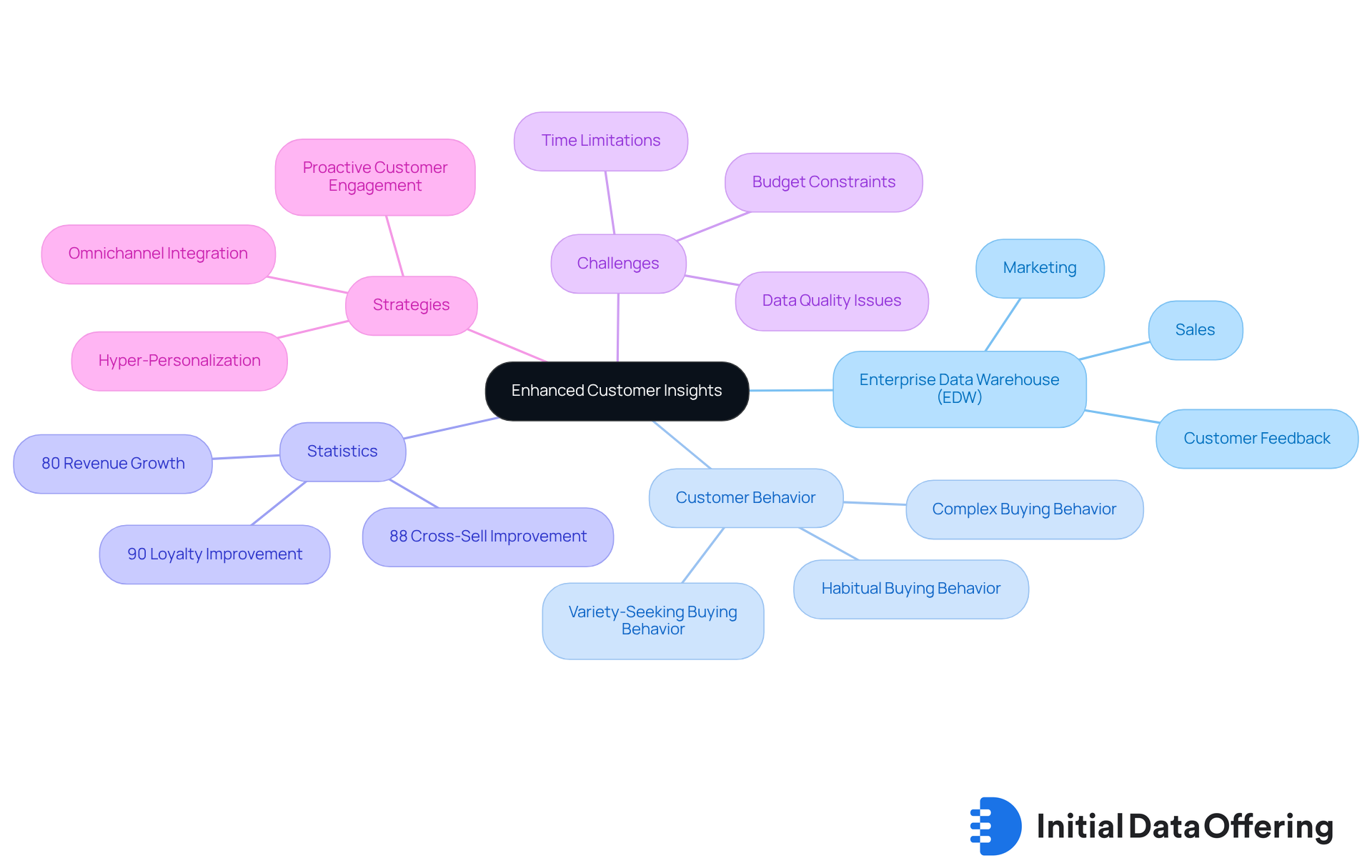
Cost Efficiency: Justify Budget Allocations with Data Solutions
Establishing an enterprise data warehouse (EDW) offers significant cost savings by enhancing information management procedures and reducing reliance on disparate systems. By consolidating information into a unified platform, organizations streamline operations, which results in considerably lower overhead costs. This improved cost efficiency allows companies to justify budget allocations for information initiatives, clearly demonstrating the tangible value of investing in robust information solutions. For instance, 62% of firms report achieving quantifiable outcomes from their investments in artificial intelligence and large datasets, underscoring the effectiveness of information-driven strategies in optimizing resource distribution.
Moreover, institutions like National Australia Bank have successfully integrated over 200 information sources into Google BigQuery. This case illustrates how centralized information management can enhance operational efficiency and facilitate informed decision-making. The impact of improved information management extends beyond immediate cost reductions; it fosters a culture of analytics-driven accountability that supports ongoing investments in information initiatives.
To begin assessing your current information management practices, consider conducting a readiness audit. This process will help identify areas for improvement and potential integration of the enterprise data warehouse (EDW), ultimately leading to more effective information management.
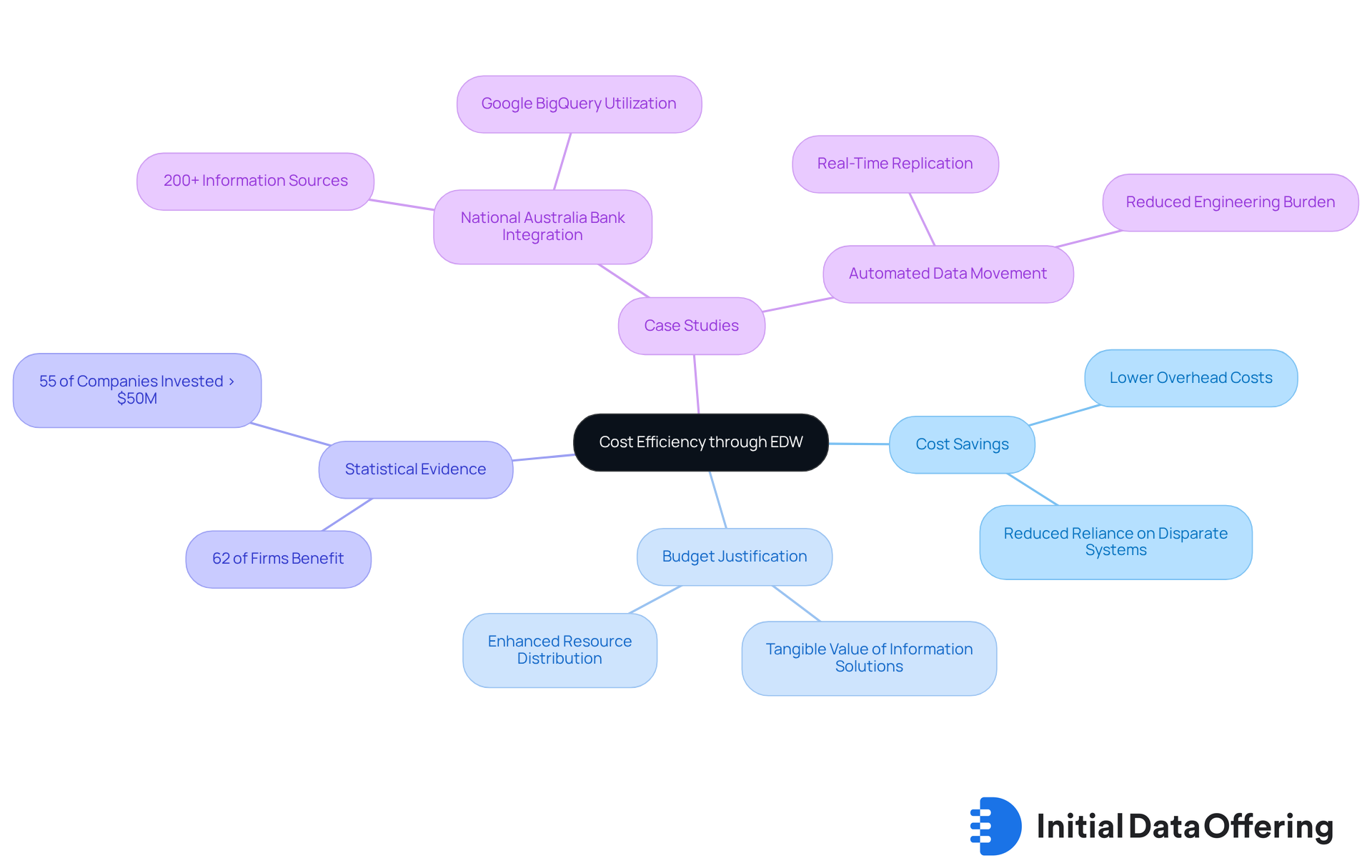
Integration Capabilities: Combine Data from Various Sources
An enterprise data warehouse (EDW) provides robust integration capabilities that enable organizations to seamlessly merge information from diverse sources. This integration fosters a comprehensive view of organizational data, allowing analysts to perform in-depth analyses. By leveraging data from various origins—such as legacy systems, social media feeds, and external databases—businesses can uncover valuable insights that inform strategic decision-making. Current trends indicate a growing reliance on cloud-based solutions and advanced integration tools, which facilitate the combination of structured and unstructured data.
For instance, the global Enterprise Information Management (EIM) market is projected to expand from USD 97.5 billion in 2023 to USD 281.9 billion by 2033, underscoring the increasing importance of effective information integration. Experts in information integration emphasize the necessity of establishing clear objectives and adopting strong governance practices to ensure data quality and relevance. As Tajammul Pangarkar notes, "Enterprise Information Management (EIM) is essential for managing critical business information through practical methods, processes, and technological frameworks."
Organizations that successfully integrate information from various sources not only enhance their analytical capabilities but also position themselves to swiftly respond to market changes and customer demands, ultimately driving innovation and operational efficiency. However, challenges such as data silos and maintaining data quality must be addressed to fully harness these integration capabilities. How can your organization navigate these challenges to maximize the benefits of the enterprise data warehouse (EDW)?
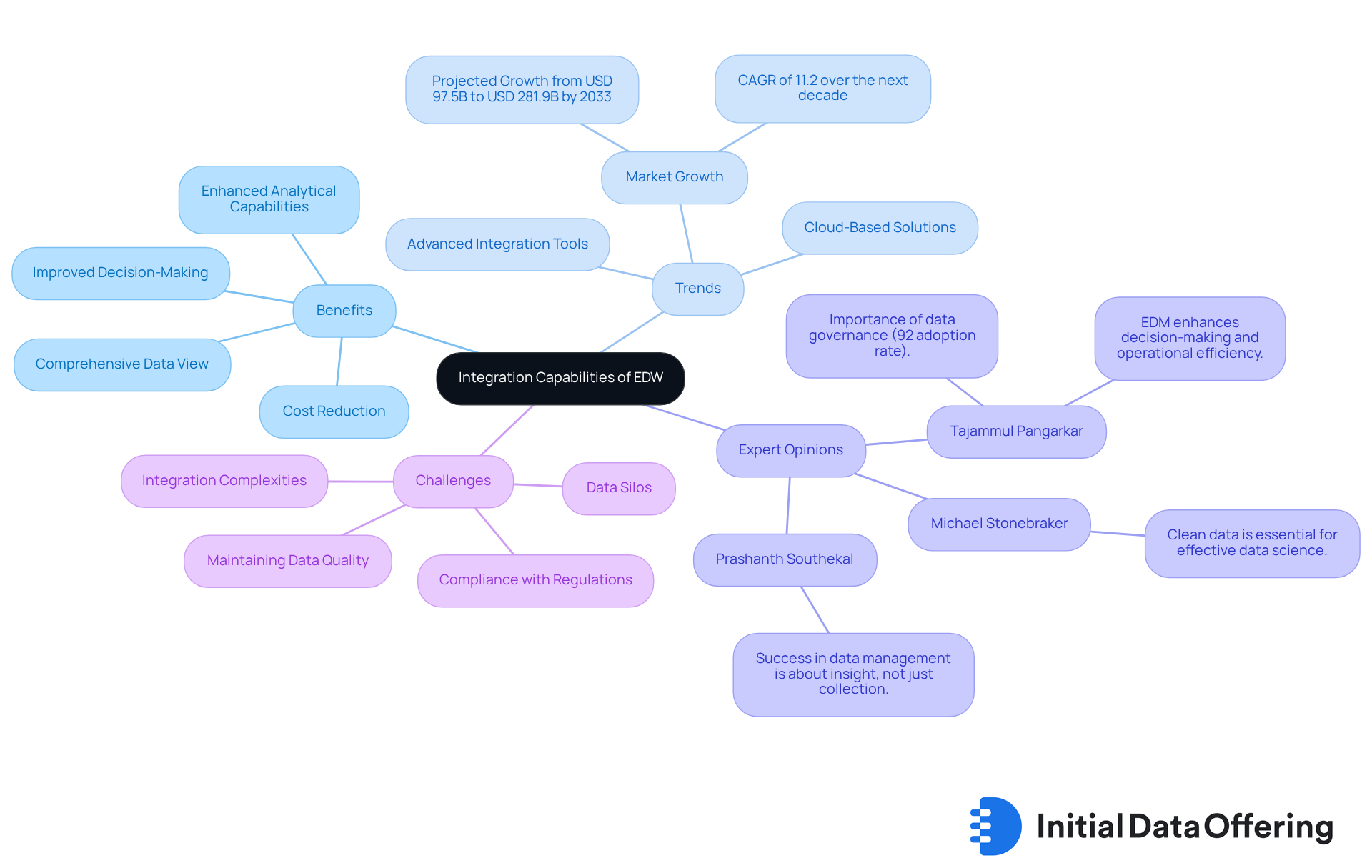
Conclusion
The advantages of adopting an Enterprise Data Warehouse (EDW) for analysts are profound and far-reaching. By centralizing data management, enhancing data quality, and providing robust integration capabilities, an EDW empowers organizations to make data-driven decisions that drive growth and operational efficiency. The insights gained from comprehensive data analysis not only facilitate strategic decision-making but also foster a culture of informed choices, leading to significant competitive advantages.
Key benefits such as improved decision-making, enhanced customer insights, and cost efficiency have been highlighted throughout this discussion. The ability to access high-quality datasets, streamline data collection, and ensure data accuracy is essential for organizations aiming to thrive in today's dynamic market landscape. Furthermore, the scalability of EDWs allows businesses to adapt to growing data needs, ensuring they remain agile and responsive to changes in their environment.
Ultimately, embracing the capabilities of an Enterprise Data Warehouse is not merely a technological upgrade; it represents a strategic imperative for organizations seeking to harness the full potential of their data. By prioritizing the integration of advanced analytics and robust data management practices, companies can unlock valuable insights that enhance their decision-making processes. The journey toward data-driven excellence begins with a commitment to leveraging the power of an EDW, paving the way for sustainable growth and innovation.
Frequently Asked Questions
What is the Initial Data Offering (IDO) platform?
The IDO platform provides analysts with access to a diverse array of high-quality datasets, which are crucial for informed decision-making. By subscribing to IDO, analysts can discover new datasets daily, helping them stay updated with the latest trends.
How does IDO enhance analytical capabilities?
The continuous influx of unique datasets from IDO enhances analysts' capabilities by empowering them to extract actionable insights that drive better business outcomes.
What percentage of companies recognize the importance of information-driven decision-making?
91% of companies recognize the importance of information-driven decision-making, highlighting the pivotal role of platforms like IDO in bridging the gap between information availability and effective analysis.
What is centralized information management?
Centralized information management involves consolidating data into a single repository, significantly enhancing the efficiency of data collection and analysis by reducing complexity and enabling quick retrieval of essential details.
What percentage of enterprises have embraced a coordinated information strategy?
57% of enterprises have adopted a coordinated information strategy, reflecting the growing acknowledgment of the significance of centralized information management.
How does an enterprise data warehouse (EDW) improve data quality?
An EDW enhances data quality through stringent governance and validation processes, ensuring that the information used for analysis is accurate, consistent, and up to date.
What percentage of entities are investing in platforms that automate lead information governance?
92% of entities are evaluating or investing in platforms that automate lead information governance, which is essential for generating reliable market insights.
What do marketing professionals prioritize to improve performance?
Research indicates that 30% of marketing professionals prioritize quality enhancements over other elements, such as workflow automation, to improve their performance.
What concerns do Chief Marketing Officers (CMOs) have regarding marketing information trustworthiness?
43% of CMOs believe that less than half of their marketing information is trustworthy, underscoring the need for companies to regularly assess their information governance frameworks.
What factors affect the completeness and consistency of information governance?
Issues related to information completeness and consistency affect 31% and 26% of respondents, respectively, highlighting the critical need for organizations to address these issues to ensure high-quality data for decision-making.